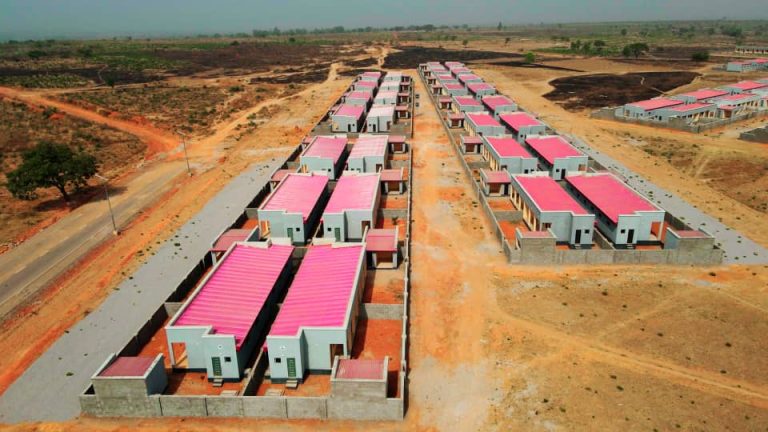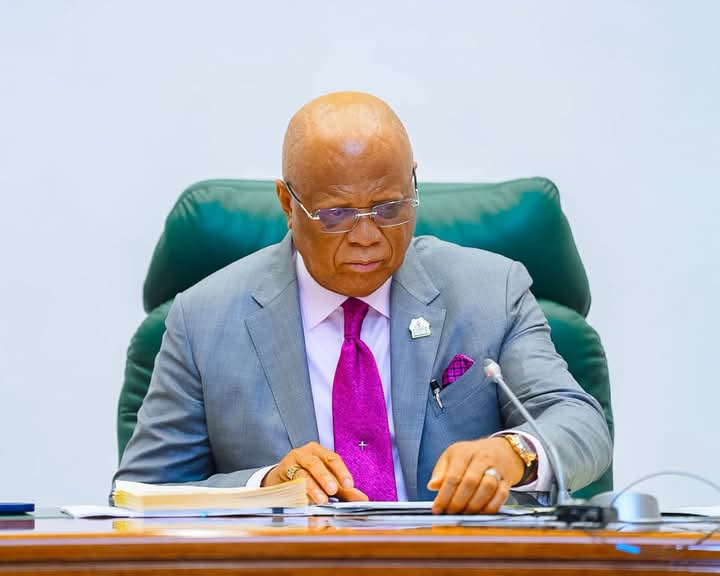
By Jerome-Mario Utomi
The air at Wetland Hotel in Ughelli, Delta State, on June 25, 2025, was charged with emotion, determination, and hope, as women from across the Niger Delta gathered not just to mark International Women’s Day but to demand real change. With the theme “Accelerating Action, Investing in Women, Advancing Rights, Leadership & Equality,”. The event, organized by Womanhood Outreach International and sponsored by the Niger Delta Development Commission (NDDC), delivered a compelling wake-up call to stakeholders and stamped the imperativeness of gender equity, equality, inclusiveness and empowerment if Nigeria must make headway in its quest for socio-economic development.
From school girls eager to glimpse their futures, to entrepreneurs and seasoned academics, the diverse gathering echoed one conviction: systemic gender inequality is injurious to Nigeria’s growth and must be dismantled.
Mrs. Imoni Ahunna, Director of Youth, Sports, Culture, and Women Affairs at NDDC, delivered a message that set the tone: “Women must no longer remain at the background. We must step into national conversations, lead advocacy, and drive the change we seek.
“At NDDC, we are not just celebrating women; we are investing in their power to transform the region”, she said.
The keynote speaker, Dr. Clara D. Moemeke, Associate Professor of Science Education at the University of Delta, Agbor, left no room for complacency and doubt as she powerfully made a case for reforms that aim to end stereotype against women and also highlighted the dangers of keeping women down. According to her, “gender equity is not inevitable, it is intentional. It is driven by bold policies, courageous advocacy, and deliberate investment. When we delay gender action, we delay national development”
She pointed to stark statistics to buttress her submission: Women, according to Dr Moemeke, make up nearly 50% of the global population, yet own only 20% of land, perform 76% of unpaid care work, and remain underrepresented in leadership, with Nigeria ranking 125th out of 146 countries on the 2024 Global Gender Gap Index.
The erudite scholar challenged the audience to look beyond celebration and brainstorm on solutions: “This theme is not a slogan, it is a mandate. Imagine a world where girls complete school without fear of marriage or violence, where women lead without bias, and where every voice matters.”
Essentially, workshops throughout the day tackled economic empowerment, inclusive governance, gender-based violence, and the urgent need for legal reforms. Women shared real-life testimonies- some survivors of abuse and trailblazers in politics and business- all united by a shared demand for justice and opportunity.
On her part, Prof. Mary Olire Edema of the Federal University of Petroleum Resources, Effurun, was of the view that women’s leadership is not a luxury but essential. “Empowering women is a catalyst for sustainable development. Leadership must begin with access to education, to finance, to political platforms, and to safety,” she emphasized during her special address.
Prof. Edema called for a cultural shift, saying, “We must move past a society where women join groups to receive handouts and into a generation where women lead cooperatives, industries, and institutions.”
The sessions were not shy of calling out Nigeria’s gender disparities. Women make up less than 4% of lawmakers in the National Assembly. Notedly, maternal mortality remains among the highest globally. In many rural communities, girls are still more likely to be married off than to finish secondary school. The COVID-19 pandemic widened this gap, pushing women out of jobs and excluding them from stimulus recovery plans.
Dr. Olufunke Chenube of the University of Delta reminded participants that gender inequality is deeply rooted in historical exclusion. “When you exclude half the population from leadership for generations, you don’t just hurt women, you cripple national progress. The laws, the systems, the economy all reflect this inherited bias”, she stressed.
The event laid out clear solutions. These include enforcing affirmative action, mainstreaming gender in national and state budgets, reforming discriminatory laws, investing in girls’ education especially in STEM fields and creating mentorship pipelines that connect young women to role models across industries.
One of the most striking voices came from a widow and small-scale farmer, Blessing Okoro from Patani. “Today, I saw myself in these women. I don’t need permission to lead, I need opportunity,” she said, drawing a standing ovation. Throughout the event, the message was clear: gender equality is not a women’s issue, it is a national priority. When women lead, data shows, societies become more prosperous, peaceful, and inclusive.
“Every time we underinvest in women, we undercut our democracy, our economy, and our humanity. This is not a charity call now, it is a strategic imperative.”
Viewed broadly, there are, in the opinion of this piece, varied and identical reasons that qualify the present advocacy as historic, exemplary, impressive, legendary and timely.
Beginning with the historical perspective, it is on good note that as Nigeria moved toward independence in the 1950s, women continued to play crucial roles in political movements. Women organizations, such as the Nigerian Women’s Union and the Nigerian Women’s Party, advocated for greater female participation in politics. Despite these efforts, the immediate post-independence period saw limited political representation for women.
For instance, in 1960, when Nigeria gained independence, only a few women held political offices. Marginalization continued despite the contributions of women like Margaret Ekpo, a politician and women’s rights activist who was one of the first women elected to the Eastern Regional House of Assembly.
Away from civil rule to the military era which lasted between 1966-1999, the struggle against marginalisation continued as military coups and subsequent military rule posed significant challenges to women’s political advancement. During these years, political spaces were predominantly male-dominated, and women’s participation in politics was severely restricted.
Reports, however, indicate that the return to civilian rule in 1999, marked a new era for women’s political participation in Nigeria. The new democratic framework provided more opportunities for women to engage in politics. The adoption of the National Gender Policy in 2006 aimed to promote gender equality and women’s empowerment in all sectors. But this has not in any practical sense erased the pangs of marginalization of women in Nigeria’s political space.
Beyond its relevance in Nigeria’s political history, NDDC’s present advocacy is also relevant at the global stage as it aligns completely, and in tandem with what development professionals promote.
Indeed, women’s equal participation in leadership, political and public life are essential to achieving the Sustainable Development Goals by 2030, NDDC’s’ latest advocacy in my view, becomes more appreciated when one remembers that available data by the United Nations show that women are underrepresented at all levels of decision-making worldwide and that achieving gender parity in political life is far off.
To further drive home this argument, a study result released in June this year, revealed that as of June 1, 2024, there are 27 countries where 28 women serve as Heads of State and/or Government. At the current rate, gender equality in the highest positions of power will not be reached for another 130 years. Just 18 countries, the study added, have a woman Head of State, and 15 countries have a woman Head of Government.
Again, data compiled by UN Women also show that women represent 23.3 percent of Cabinet members heading Ministries, leading a policy area as of January 1, 2024. There are only 15 countries in which women hold 50 percent or more of the positions of Cabinet Ministers leading policy areas. The five most commonly held portfolios by women Cabinet Ministers are Women and gender equality, followed by Family and children affairs, social inclusion and development, social protection and social security, and Indigenous and minority affairs’’.
Similar to what NDDC advocates, the referenced report went further to say that only 26.9 percent of parliamentarians in single or lower houses are women, up from 11 percent in 1995. Only six countries have 50 percent or more women in parliament, in single or lower houses: Rwanda (61 percent), Cuba (56 percent), Nicaragua (54 percent), Andorra (50 percent), Mexico (50 percent), New Zealand (50 percent), and the United Arab Emirates (50 percent). A further 22 countries have reached or surpassed 40 percent, including 13 countries in Europe, five in Africa, four in Latin America and the Caribbean, and one in Asia-Pacific. Globally, there are 21 States in which women account for less than 10 percent of parliamentarians in single or lower houses, including two lower chambers with no women at all.
At the current rate of progress, gender parity in national legislative bodies will not be achieved before 2063. Women hold 36 percent of parliamentary seats in Latin America and the Caribbean and make up 33 percent of parliamentarians in Europe and Northern America. In sub-Saharan Africa, there are 27 percent of women legislators, followed by Eastern and South-Eastern Asia with 23 percent, Oceania with 20 percent, Central and Southern Asia and Northern Africa and Western Asia where, in both regions, women make up 18 percent of women Members of Parliament.
In a related development, data from 141 countries show that women constitute more than 3 million (35.5 percent) of elected members in local deliberative bodies. Only three countries have reached 50 percent, and an additional 22 countries have more than 40 percent women in local government. Regional variations are also noted for women’s representation in local deliberative bodies, as of January 2023: Central and Southern Asia, 41 percent; Europe and Northern America, 37 percent; Oceania, 32 percent; Eastern and South-Eastern Asia, 31 percent; Latin America and the Caribbean, 27 percent; sub-Saharan Africa, 25 percent; Western Asia and Northern Africa, 20 percent.
“Balanced political participation and power-sharing between women and men in decision-making is the internationally agreed target set in the Beijing Declaration and Platform for Action. While most countries in the world have not achieved gender parity, gender quotas have substantially contributed to progress over the years. In countries with legislated candidate quotas, women representation is five percentage points and seven percentage points higher in parliaments and local government, respectively, compared to countries without such legislation”, the report remarked
In fact, there is evidence that women leadership in political decision-making processes improves them. For example, research on panchayats (local councils) in India discovered that the number of drinking water projects in areas with women-led councils was 62 percent higher than in those with men-led councils.
Utomi, a Media Specialist writes from Lagos, Nigeria. He could be reached via Jeromeutomi@yahoo.com/08032725374.




